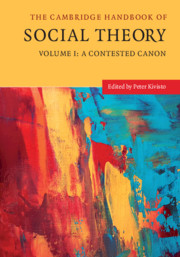Book contents
- The Cambridge Handbook of Social Theory
- The Cambridge Handbook of Social Theory
- Copyright page
- Contents
- Figures
- Tables
- Contributors
- Preface
- 1 The Emergence of Social Theory
- 2 “What Is a Classic?”
- 3 Karl Marx
- 4 The Marxist Legacy
- 5 Émile Durkheim: Theorist of Solidarity
- 6 What’s in a Name?
- 7 Max Weber
- 8 Weberian Social Theory
- 9 Georg Simmel and the Metropolitization of Social Life
- 10 Pounding on Parsons: How Criticism Undermined the Reputation of Sociology’s Incurable Theorist
- 11 Symbolic Interactionism
- 12 Erving Goffman and Dramaturgical Sociology
- 13 Structuralism
- 14 Norbert Elias, Civilising Processes, and Figurational (or Process) Sociology
- 15 Phenomenology and Social Theory
- 16 Pierre Bourdieu: An Intellectual Legacy
- 17 Developing Ethnomethodology: Garfinkel on the Constitutive Interactional Practices in Social Systems of Interaction
- 18 Jürgen Habermas
- 19 Anthony Giddens, Structuration Theory, and Radical Politics
- Index
- References
7 - Max Weber
Published online by Cambridge University Press: 03 December 2020
- The Cambridge Handbook of Social Theory
- The Cambridge Handbook of Social Theory
- Copyright page
- Contents
- Figures
- Tables
- Contributors
- Preface
- 1 The Emergence of Social Theory
- 2 “What Is a Classic?”
- 3 Karl Marx
- 4 The Marxist Legacy
- 5 Émile Durkheim: Theorist of Solidarity
- 6 What’s in a Name?
- 7 Max Weber
- 8 Weberian Social Theory
- 9 Georg Simmel and the Metropolitization of Social Life
- 10 Pounding on Parsons: How Criticism Undermined the Reputation of Sociology’s Incurable Theorist
- 11 Symbolic Interactionism
- 12 Erving Goffman and Dramaturgical Sociology
- 13 Structuralism
- 14 Norbert Elias, Civilising Processes, and Figurational (or Process) Sociology
- 15 Phenomenology and Social Theory
- 16 Pierre Bourdieu: An Intellectual Legacy
- 17 Developing Ethnomethodology: Garfinkel on the Constitutive Interactional Practices in Social Systems of Interaction
- 18 Jürgen Habermas
- 19 Anthony Giddens, Structuration Theory, and Radical Politics
- Index
- References
Summary
Max Weber’s work explored two great themes from a universal comparative historical perspective: the relationship between economy and society, and the effects of religion on socioeconomic life. This chapter sets forth his theses and accomplishments in investigating these themes, particularly as related to the world of modern capitalism. In this context, it also considers his analyses of rationality, rationalization processes, authority or domination, and the nature of the scientific calling, as well as the enduring significance of the Weberian legacy.
Lawrence A. Scaff is Professor Emeritus of Political Science and Sociology at Wayne State University, Detroit. He is the author of Fleeing the Iron Cage (1989), Max Weber in America (2011), and Weber and the Weberians (2014), and coedited The Oxford Handbook of Max Weber (2019).
- Type
- Chapter
- Information
- The Cambridge Handbook of Social Theory , pp. 124 - 144Publisher: Cambridge University PressPrint publication year: 2020

